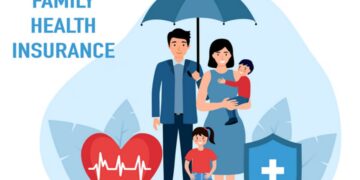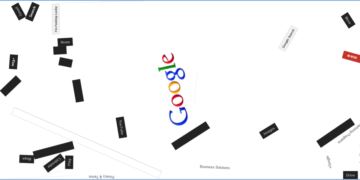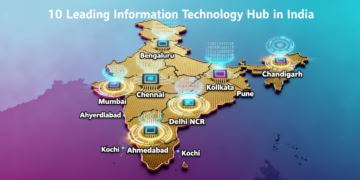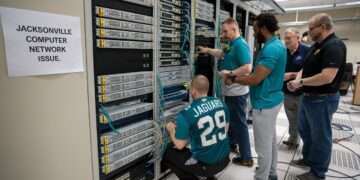Living in Jacksonville, we rely heavily on our internet and home networks for work, entertainment, and staying connected. So, when a Jacksonville computer network issue strikes, it can be incredibly frustrating. Whether your Wi-Fi is acting up, your internet is crawling, or you can’t access shared files, you’re not alone. This comprehensive guide will walk you through common problems, provide actionable solutions, and help you get your network back on track.
Understanding Your Jacksonville Computer Network Issue
Before diving into solutions, it’s helpful to understand the different components of your home network and where problems might arise.
Key Components of Your Home Network:
- Modem: This device connects your home to your Internet Service Provider (ISP), like Xfinity, AT&T, or Spectrum. It translates the signal from your ISP into a format your router can understand.
- Router: This device creates your local network, allowing multiple devices (computers, phones, smart TVs) to connect to the internet and to each other. Many homes use a combined modem/router unit.
- Ethernet Cables: These physical cables connect devices directly to your router or modem, providing a stable and often faster connection than Wi-Fi.
- Wi-Fi (Wireless Fidelity): This is the wireless signal emitted by your router, allowing devices to connect without cables.
- Devices: Your computers, smartphones, tablets, smart home devices – anything that connects to your network.
Common Symptoms of a Network Problem:
- No Internet Access: The most obvious sign. You can’t browse websites, stream videos, or use online apps.
- Slow Internet Speeds: Websites load slowly, videos buffer constantly, and downloads take forever.
- Intermittent Connection: Your internet works sometimes, then cuts out, then comes back.
- Unable to Connect to Wi-Fi: Your device sees the Wi-Fi network but can’t connect, or asks for the password repeatedly.
- Cannot Access Networked Devices: You can’t see or connect to other computers, printers, or storage drives on your home network.
Initial Troubleshooting: The Basics (Always Start Here!)
Before you panic or call for help, try these fundamental troubleshooting steps. You’d be surprised how often they resolve a Jacksonville computer network issue.
The Golden Rule: Reboot Everything
It sounds simple, but a fresh start often clears up temporary glitches.
- Unplug your modem from the power outlet.
- Unplug your router from the power outlet (if it’s a separate device).
- Wait 30-60 seconds. This allows the devices to fully power down and clear their memory.
- Plug in your modem first. Wait for all indicator lights (especially the online/internet light) to stabilize – this can take a few minutes.
- Plug in your router. Wait for its indicator lights to stabilize.
- Reboot your computer/device. Once both modem and router are fully online, restart the device you’re trying to connect.
Check Your Cables and Connections
Loose or damaged cables are a frequent culprit.
- Ethernet Cables: Ensure all Ethernet cables are securely plugged into your modem, router, and devices. Check for kinks, cuts, or frayed ends.
- Power Cables: Make sure the power adapters for your modem and router are firmly plugged into the wall outlet and the device itself.
- Coaxial Cable (for cable internet): Ensure the coaxial cable connecting your modem to the wall jack is tight and undamaged.
Test Multiple Devices
Is the problem isolated to one device or affecting everything?
- If only one device (e.g., your laptop) has no internet, the issue is likely with that device’s Wi-Fi adapter or settings, not your overall network.
- If multiple devices (e.g., your laptop, phone, smart TV) can’t connect, the problem is almost certainly with your modem, router, or ISP.
Common Jacksonville Computer Network Issues and Their Solutions
Let’s dive into specific scenarios you might encounter.
Table: Common Network Problems and Quick Fixes
| Problem Symptom | Potential Cause | Quick Fix |
|---|---|---|
| No Internet Access | ISP outage, modem/router issue, faulty cables | 1. Reboot modem/router. 2. Check all cable connections. 3. Check ISP status page or call support. 4. Try connecting directly to modem (if separate router) to rule out router issue. |
| Slow Internet Speeds | Bandwidth congestion, Wi-Fi interference, old hardware | 1. Reboot modem/router. 2. Disconnect unused devices. 3. Move router closer to devices. 4. Change Wi-Fi channel. 5. Consider a newer router or higher ISP plan. 6. Use Ethernet for critical devices. |
| Intermittent Connection | Wi-Fi interference, overheating router, firmware bugs | 1. Reboot modem/router. 2. Check for overlapping Wi-Fi networks (use a Wi-Fi analyzer app). 3. Ensure router has good ventilation. 4. Update router firmware. 5. Consider a Wi-Fi extender/mesh system for dead zones. |
| Cannot Connect to Wi-Fi | Incorrect password, Wi-Fi disabled, router problem | 1. Double-check Wi-Fi password. 2. Ensure Wi-Fi is enabled on your device. 3. Reboot router. 4. Forget the network on your device and try reconnecting. 5. Check router settings (SSID broadcast). |
| Frequent Disconnections | Overheating, faulty hardware, signal strength issues | 1. Ensure adequate ventilation for router. 2. Check for physical obstructions to Wi-Fi signal. 3. Update router firmware. 4. Consider placing router in a central location. 5. Check for conflicting devices (e.g., microwaves). |
Deep Dive into Specific Jacksonville Computer Network Issues
1. ISP Outage in Jacksonville
Sometimes, the problem isn’t with your equipment at all. Your Internet Service Provider (ISP) might be experiencing an outage in the Jacksonville area.
How to Check:
- ISP Status Pages: Visit the official status page for Xfinity, AT&T, Spectrum, etc. (often found by searching “Xfinity outage Jacksonville”).
- Down Detector: Websites like Down Detector can show real-time outage maps and user reports.
- Social media: Check your ISP’s Twitter or Facebook page for announcements.
- Ask Neighbors: If neighbours using the same ISP are also experiencing issues, it’s likely an outage.
Solution: If it’s an outage, there’s not much you can do but wait. Contact your ISP for estimated restoration times.
2. Wi-Fi Signal Issues and Dead Zones
Jacksonville homes come in all shapes and sizes, and sometimes, your Wi-Fi just can’t reach every corner.
Causes:
- Distance: The further you are from the router, the weaker the signal.
- Obstructions: Walls (especially brick or concrete), metal objects, and even large appliances can block Wi-Fi signals.
- Interference: Other electronic devices (cordless phones, microwaves, Bluetooth devices) or even your neighbors’ Wi-Fi networks can interfere with yours.
Solutions:
- Relocate Your Router: Place your router in a central, open location, away from walls and large electronic devices. Elevating it can also help.
- Change Wi-Fi Channel: Wi-Fi networks operate on specific channels. If your neighbors are on the same channel, it can cause interference. Access your router’s settings (usually by typing an IP address like 192.168.1.1 into your browser) and experiment with different channels (1, 6, and 11 are generally recommended for 2.4GHz, while 5GHz has more options).
- Use a Wi-Fi Analyzer App: Apps like “Wi-Fi Analyzer” (Android) or “Network Analyzer” (iOS) can help you visualize Wi-Fi signals in your home and identify optimal channels.
- Consider a Wi-Fi Extender/Repeater: These devices rebroadcast your Wi-Fi signal, extending its range.
- Invest in a Mesh Wi-Fi System: For larger Jacksonville homes, a mesh system provides multiple access points that work together to create a seamless, strong Wi-Fi network throughout your house.
- Utilize Ethernet Cables: For devices that don’t move (desktop computers, smart TVs, gaming consoles), a direct Ethernet connection offers the most stable and fastest connection, bypassing Wi-Fi issues entirely.
3. Outdated Router Firmware
Router manufacturers regularly release firmware updates to improve performance, fix bugs, and enhance security. An outdated firmware can lead to an unstable Jacksonville computer network issue.
Solution:
- Access Router Settings: Log in to your router’s administration page (check your router’s manual or the sticker on the bottom for the IP address and login credentials).
- Find Firmware Update Section: Look for a section like “Administration,” “System,” or “Firmware Update.”
- Check for Updates: Follow the instructions to check for and install any available updates. Do not power off your router during this process!
4. DNS Server Issues
The Domain Name System (DNS) translates website names (like google.com) into IP addresses that computers understand. If your DNS server is having problems, you might not be able to access websites even if your internet connection is technically active.
Solution:
- Change DNS Servers: You can configure your computer or router to use public DNS servers like Google DNS (8.8.8.8 and 8.8.4.4) or Cloudflare DNS (1.1.1.1). This is often done in your network adapter settings on your computer or directly in your router’s settings.
5. IP Address Conflicts
Rarely, two devices on your network might try to use the same IP address, causing connectivity problems.
Solution:
- Reboot Router: This usually forces the router to reassign IP addresses, resolving the conflict.
- Renew IP Address on Device: On your computer, you can release and renew your IP address via the command prompt (Windows: ipconfig /release then ipconfig /renew; macOS: sudo ipconfig set en0 BOOTP then sudo ipconfig set en0 DHCP or simply turn Wi-Fi off and on).
When to Call a Professional for Your Jacksonville Computer Network Issue
While many network problems can be resolved with a bit of troubleshooting, some issues are best left to the experts.
- Persistent Problems: You’ve tried everything in this guide, and your Jacksonville computer network issue just won’t go away.
- Complex Setup: You have a smart home with many connected devices, a home office requiring robust network security, or you’re setting up a new network from scratch.
- Hardware Failure: You suspect your modem or router is physically failing (e.g., no lights, strange noises, overheating). Your ISP can often replace a faulty modem.
- No Time or Expertise: You simply don’t have the time or patience to troubleshoot, or you feel overwhelmed by the technical aspects.
There are many reputable IT support services in Jacksonville that specialize in home and small business network solutions. Don’t hesitate to seek professional help if you’re stuck!
Conclusion
Facing a Jacksonville computer network issue can be disruptive, but with the right approach, many problems are solvable from your home. By systematically troubleshooting, understanding your network components, and applying the solutions outlined in this guide, you’ll be well-equipped to get back online quickly. Remember, if you hit a wall, local professional help is always available to ensure your Jacksonville network runs smoothly.
FAQs: Your Jacksonville Computer Network Issue Questions Answered
Q1: How do I find my router’s IP address and login details?
A1: Most routers have a sticker on the bottom with the default IP address (often 192.168.1.1, 192.168.0.1, or 192.168.1.254), a username (often “admin”), and a default password. If you’ve changed it and forgotten, you might need to perform a factory reset on your router (which will erase all your custom settings).
Q2: My internet is slow, but I’m getting good speeds when connected directly to the modem. What does that mean?
A2: This strongly suggests your router is the bottleneck. The issue is likely with your router’s performance, Wi-Fi signal, or settings rather than your ISP’s connection. Consider relocating your router, optimizing Wi-Fi channels, or upgrading to a newer, more powerful router.
Q3: What’s the difference between 2.4 GHz and 5 GHz Wi-Fi? Which should I use?
A3:
2.4 GHz: Offers wider coverage and better penetration through walls but is generally slower and more susceptible to interference. Good for devices further from the router or for general Browse.
5 GHz: Provides faster speeds and less interference but has a shorter range and struggles with obstacles. Ideal for devices close to the router that require high bandwidth (streaming, gaming). Most modern routers support both. Use 5GHz for devices needing speed and 2.4GHz for devices further away or those that don’t require high bandwidth.
Q4: My Wi-Fi keeps disconnecting, even after rebooting. What else can I do?
A4: Besides the solutions mentioned (changing Wi-Fi channel, checking for interference, firmware update), consider:
· Overheating: Ensure your router is in a well-ventilated area.
· Power Supply Issues: A failing power adapter can cause intermittent disconnections.
· Number of Devices: Too many devices connected to an older router can overload it.
· Router Age: Routers, like any electronics, have a lifespan. After 3-5 years, they can start to degrade in performance.
Q5: Can a VPN cause network issues?
A5: Sometimes, yes. While VPNs are great for security and privacy, they can sometimes slow down your internet connection or cause connectivity issues if not configured correctly or if the VPN server is overloaded. Try disabling your VPN temporarily to see if your network issue resolves.
Q6: I just moved to Jacksonville. How do I choose the best internet provider?
A6: Research providers available in your specific Jacksonville zip code (Xfinity, AT&T Fiber, Spectrum, T-Mobile Home Internet, etc.). Compare:
· Speeds: What upload and download speeds do you need?
· Pricing: Look for introductory offers and regular rates.
· Data Caps: Some providers have data limits.
· Customer Service: Read reviews about their local customer support.
· Bundles: Consider if you need TV or phone services bundled.


























